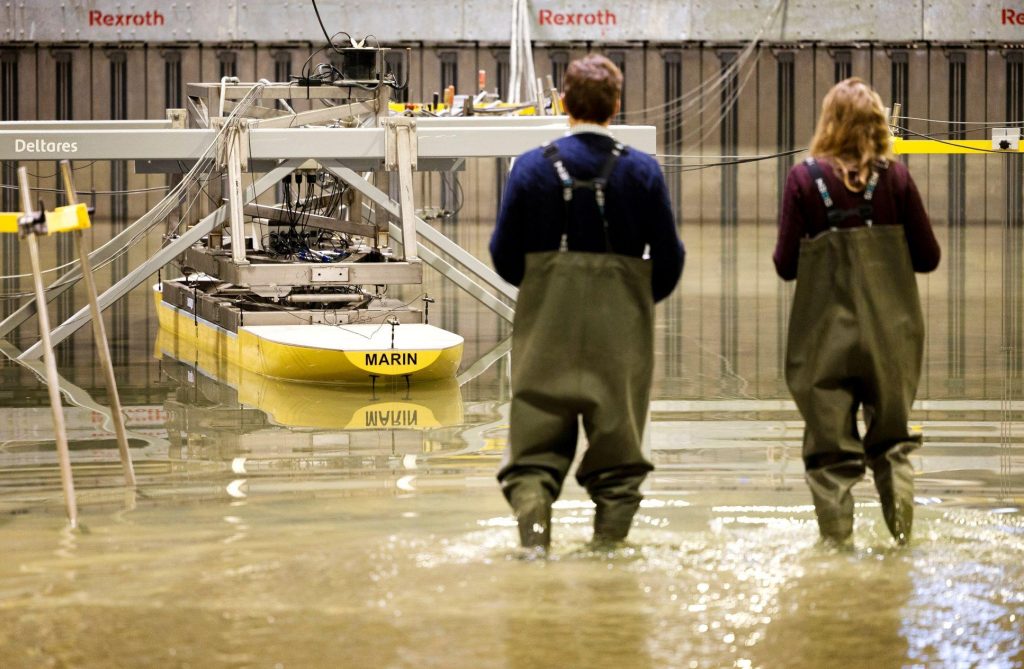Alliances
The major challenges on which Deltares is working to keep our deltas, coastal and river areas safe, sustainable and habitable require intensive collaboration. An open culture and a pro-active mindset are needed here to make the sharing of knowledge possible and encourage people to learn from each other as well. That is why we are constantly forging new alliances; we think this is essential in the search for innovation and sustainable solutions. Those alliances often involve co-creation with policymakers, administrators, fellow knowledge institutes and the business sector. Nationally and internationally. As a result, there are opportunities to perform even better together, while minimising the costs.
As an independent knowledge institute, Deltares has robust relationships with many organisations. The joint approach involving knowledge institutes, companies, NGOs and government authorities opens up a wealth of knowledge and experience that Deltares is eager to deploy and share as widely as possible. Our contribution sometimes targets the development and introduction of the long-term perspective.
Once again here, Deltares works with engineering and consultancy firms to jointly develop knowledge that is directly applicable. Collaboration with universities is intensive and the aim is to enrich applied research with the latest insights and knowledge. Together, we achieve more and bring solutions to issues facing society closer.
Our knowledge is based on our view of water, the subsurface and the infrastructure located there as a single system. Finding sustainable and practical solutions starts with thinking in terms of the physical and the administrative system. Our in-depth, substantive and specialised knowledge is indispensable here.
Dirk-Jan Walstra, director
Integrity in research
Deltares conducts independent research according to the standards of the 'Netherlands Code of Conduct for Research Integrity'. This code (2018) is endorsed by the KNAW, NFU, NWO, the TO2 federation, the Association of Universities of Applied Sciences and the VSNU. The principles contained therein are guiding for Deltares researchers and research:
- Honesty
- Carefulness
- Transparency
- Independence
- Responsibility
Diversity in partnerships
Government
The government is, and will remain, our most important knowledge partner. That applies to all government authorities in the Netherlands: municipal authorities, water authorities, provincial authorities and the central government. We design many research programmes in close collaboration with the Ministry of Infrastructure and Water Management, with Rijkswaterstaat as the main operational organisation.
Deltares also works extensively with the other ministries. For example, the Ministry of Economic Affairs and Climate, as the lead organisation for Deltares as a TO2 institute (for applied research), grants an annual subsidy with the aim of adding to the knowledge base for the longer term. That is essential for the future of the Netherlands.
In addition to its work for government authorities, Deltares works with public organisations such as drinking water companies, network operators, and safety regions.
Universities and other insitutes of higher education
Universities are the source of fundamental knowledge for Deltares. We transform that knowledge into applied research. Deltares works with both Dutch universities and foreign institutes in structural ways over longer periods of time.
Knowledge is shared by, for example, extensive exchanges of staff: through chairs, doctorate research, and students. Both nationally and internationally, there are major research projects on which we work jointly.
Our partnerships with other institutes of higher education helps to strengthen the regional embedding of knowledge. The joint work on the applied research at these institutes makes it possible to disseminate the knowledge of the TO2 institutes faster and more widely to the regions, including SMEs.
TO2 institutions and National Knowledge Institutes (RKIs)
Alongside MARIN, NLR, TNO and WUR, Deltares is one of the five TO2 institutes: the alliance of five top Dutch institutes for applied research.
The major societal challenges often require cross-sector collaboration. We work with fellow knowledge institutes all sorts of themes: with the partners from both the TO2 federation and with the National Knowledge Institutes (RKIs). Deltares ensures that our knowledge development complements that of our partners.
Examples include research on climate adaptation with the Royal Netherlands Meteorological Institute (KNMI) and the energy transition with the Netherlands Organisation for Applied Scientific Research (TNO). In the field of spatial planning and the relationship with water and subsurface knowledge, for example in the areas of land subsidence and the future of peatland areas, we team up with Wageningen Research.
There are also knowledge partnerships with the Netherlands Institute for Marine Research (NIOZ) about planning for the North Sea, where many challenges converge.

The commercial sector
Deltares works with consultancy firms and companies on the operational side. For us, collaboration with both multinationals and start-ups is self-evident and very important. Examples include engineering and consultancy firms, construction and dredging companies and SMEs.
Collaboration can be organised in the top-sector context through, for example, TKI projects (Top Consortia for Knowledge and Innovation), Joint Industry Projects (JIPs) or Public-Private Partnerships (PPPs).
Knowledge transfer and innovation with the aim of application in practice is a priority for Deltares. An example is working with SMEs through our annual facility challenge. We give SMEs with innovative ideas access to the Deltares test facilities. The facility changes every quarter: from the Delta Flume to the microbiology laboratory, and from the GeoCentrifuge to field measurements.
International partners
In order to use knowledge to make a difference for the challenges of today and tomorrow, the knowledge of Deltares must be in the global top flight. In addition to participating in European research projects, we therefore have direct relationships with sister organisations worldwide.
Examples of our alliances with renowned institutes include: the United States Geological Survey (USGS), the World Resources Institute (WRI), the National Weather Service (NWS) and the National University of Singapore (NUS).
This valuable, international connection opens up more opportunities for the Netherlands to benefit from the latest developments in Europe and the rest of the world. International exchanges bring new insights, methods and access to research facilities that would otherwise be beyond our reach. They give Dutch companies direct access to foreign markets and attract top international talent.

